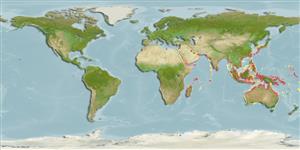Common names from other countries
>
Anguilliformes (Eels and morays) >
Ophichthidae (Snake eels) > Ophichthinae
Etymology: Pisodonophis: Greek, piso, pipisko = to drink + Greek, odous = teeth + Greek, ophis = serpent .
More on author: Hamilton.
Environment: milieu / climate zone / depth range / distribution range
экология
морской; пресноводный; солоноватоводный демерсальный; анадромный (Ref. 51243); пределы глубины ? - 10 m (Ref. 86942). Tropical
Indo-West Pacific: Somalia (Ref. 30573) and Tanzania south to Knysna, South Africa (Ref. 3972), including the Seychelles (Ref. 7245); also southern India and Sri Lanka (Ref. 7245). Widespread elsewhere from the east Indian coast throughout Indonesia to Polynesia (Ref. 7245).
Size / Вес / Возраст
Maturity: Lm ? range ? - ? cm
Max length : 100.0 cm TL самец/пол неопределен; (Ref. 3972); common length : 70.0 cm TL самец/пол неопределен; (Ref. 7245)
колючие лучи спинного плавника (общее число): 0; колючие лучи анального плавника 0; позвонки: 171 - 180. Diagnosis: Body snake-like, cylindrical, compressed only along extreme tail tip; anterior nostril tubular, posterior along lower edge of lip; teeth granular to molariform, multiserial bands on jaws and vomer, but sharper on jaws and more pointed in young individuals; median fins not continuous posteriorly; extreme tip of tail stiff and finless; dorsal fin origin about a pectoral fin length behind tips of pectoral fins; lateral line inconspicuous (Ref. 4832).
Found in lagoons and estuaries, entering freshwater and paddy fields (Ref. 7245, 30573). Common in tidal reaches and nearby upstream areas of coastal rivers (Ref. 12693). Lives in holes in the river bottom and bank and actively forages for small fishes at night (Ref. 12693). Reported to spawn in rice-paddies during the rainy season (Ref. 12693). Caught in bag nets and similar gear. Marketed fresh.
Life cycle and mating behavior
половая зрелость | размножение | нерест | икра | Fecundity | личинки
Castle, P.H.J., 1984. Ophichthidae. p. 38-39. In J. Daget, J.-P. Gosse and D.F.E. Thys van den Audenaerde (eds.) Check-list of the freshwater fishes of Africa (CLOFFA). ORSTOM, Paris and MRAC, Tervuren. Vol. 1. (Ref. 3508)
Статус Красного Списка МСОП (Ref. 130435)
CITES (Ref. 128078)
Not Evaluated
Угроза для людей
Harmless
Использование человеком
рыболовство: не имеет хозяйственного значения; наживка: usually
дополнительная информация
ссылкиаквакультура (рыбоводство)особенности рыбоводствастепень растяжениягенетикаElectrophoresesнаследуемостьболезниобработкаMass conversion
инструменты
Специальные отчеты
Скачать в формате XML
ресурсы в Интернет
Estimates based on models
Preferred temperature (Ref.
115969): 24.6 - 29.2, mean 28.5 (based on 2626 cells).
Phylogenetic diversity index (Ref.
82804): PD
50 = 0.5020 [Uniqueness, from 0.5 = low to 2.0 = high].
Bayesian length-weight: a=0.00093 (0.00047 - 0.00184), b=2.97 (2.80 - 3.14), in cm Total Length, based on LWR estimates for this species & (Sub)family-body (Ref.
93245).
Trophic level (Ref.
69278): 4.0 ±0.71 se; based on food items.
устойчивость к внешним воздействиям (Ref.
120179): средний (среднего размера), минимальное время удвоения популяции 1.4-4.4 года (Preliminary K or Fecundity.).
Fishing Vulnerability (Ref.
59153): High vulnerability (60 of 100).
